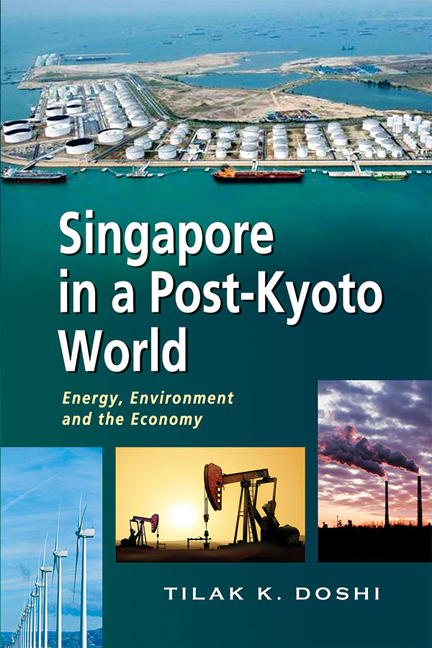Book contents
- Frontmatter
- Dedication
- Contents
- List of Tables and Figures
- Preface
- Acknowledgements
- List of Abbreviations
- Introduction
- 1 Economy, Energy, and Emissions
- 2 Climate Change Negotiations: From Copenhagen to Durban via Cancun
- 3 Climate Change Finance: Who Pays and Who Receives?
- 4 Singapore's External Sector: Impacts of Emission Mitigation Policies
- 5 Energy and Emissions: The Five Strategies
- 6 Concluding Remarks: “The Three E's”
- Index
- About the Author
- Frontmatter
- Dedication
- Contents
- List of Tables and Figures
- Preface
- Acknowledgements
- List of Abbreviations
- Introduction
- 1 Economy, Energy, and Emissions
- 2 Climate Change Negotiations: From Copenhagen to Durban via Cancun
- 3 Climate Change Finance: Who Pays and Who Receives?
- 4 Singapore's External Sector: Impacts of Emission Mitigation Policies
- 5 Energy and Emissions: The Five Strategies
- 6 Concluding Remarks: “The Three E's”
- Index
- About the Author
Summary
The curious task of economics is to demonstrate to men how little they really know about what they imagine they can design.
Friedrich August von HayekPolicymakers in Singapore, like their counterparts elsewhere, are faced with balancing priorities in meeting the simultaneous requirements of economic growth, energy security and environmental sustainability. To be sure, each of these broad societal objectives can mean radically different things to different constituencies of the population. Academics, businessmen, and career civil servants, along with the ordinary man on the street, would naturally have their own perspectives and questions on what each of these objectives entail. How are such objectives ranked? What do they mean in terms of concrete policy initiatives and regulatory action on the part of government and how would such governmental action affect the daily lives of consumers and businesses? How are trade-offs (if they do occur) between one policy objective (say energy security) and another (say economic competitiveness) weighed and debated in public?
Policy challenges related to energy sector issues facing Singapore can be grouped into four broad areas. The first policy challenge, on the domestic front, is the perceived need to promote energy efficiency and ‘renewable’ energy initiatives among local households and businesses sensitive to new cost burdens on existing financial budgets and bottom lines. The potential for improving energy efficiency and adopting new energy technologies in cost-efficient ways has attracted the keen attention of policymakers. Can we reduce energy use and emissions while at the same time reducing consumer or production costs? Are there barriers to households or businessmen from discovering cheaper ways of using energy or reducing pollutants and carbon emissions? What can governments do to help overcome these barriers?
Policy attention in the international arena covers three concerns. The first lies in the need to participate in international and regional forums in a way which balances the need to commit to reasonable national targets in energy intensity and emissions reduction metrics while ensuring that the country's economic competitiveness and growth prospects are not compromised by inefficient or defective multilateral agreements. How would the financial costs of such agreements be allocated among the parties to such agreements? Who are the likely net donors and net recipients in possible future international or regional climate change agreements?
- Type
- Chapter
- Information
- Singapore in a Post-Kyoto WorldEnergy, Environment and the Economy, pp. 1 - 4Publisher: ISEAS–Yusof Ishak InstitutePrint publication year: 2015



